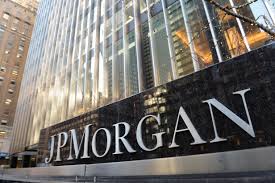JPMorgan’s Stock Rose on Strong Earnings—Then Fell on Its CEO’s Buzzkill Outlook

JPMorgan’s third-quarter earnings report offered both a bang and a whimper. The whimper echoed louder in the ears of investors.
The bang: JPMorgan’s revenue rose 5.2% to $ 27.8 billion, beating analyst expectations by $ 380 million. Earnings came in at $ 2.34 a share, again beating forecasts by eight cents. For a few glorious moments, investors cheered the prospect of bank earnings doing better than last week’s selloff would indicate. JPMorgan’s shares popped up 2.5%.
Then came the whimper. Once investors had a few minutes to digest CEO Jamie Dimon’s letter to shareholders, which accompanied the earnings report, they started selling.
In his letter, Dimon lavishly praised the strengths of the U.S. economy: job growth, higher wages, capital spending, etc. But he also discreetly fretted about the very themes that have troubled the U.S. stock market this week: rising interest rates and trade tensions with China. The S&P 500 lost 7% of its value during the six days before JPMorgan’s earnings report, although they rose 1.4% Friday.
“Changing expectations, whether around inflation, growth or recession (yes, there will be another recession—we just don’t know when), supply and demand, sentiment and other factors, can cause drastic volatility,” Dimon wrote. “While in the past, interest rates have been lower and for longer than people expected, they may go higher and faster than people expect.”
If that’s not the reassurance investors were hoping for, he had unsettling thoughts on trade as well, after name-checking President Trump.
“We have entered a time of uncertainty over global trade. President Trump… has begun to demand material changes in our trade agreements with many nations,” Dimon wrote in the letter. “There is always a chance that miscalculations on the part of the various actors could lead to negative outcomes. This obviously creates higher risk and more uncertainty until resolved.”
Dimon closed his thoughts on U.S. policy with words that sounded like a softly worded warning: “It is an absolute necessity that America maintain a world-class economy, with world-class companies and a world-class military. We need to do a significantly better job of managing our economy if we want it to be world class.”
On a conference call with investors, Wells Fargo Securities analyst Mike Mayo asked Dimon to expand on his comments. “Your CEO letter highlights the expectation that interest rates would go a lot higher,” Mayo said. “But, it doesn’t seem like the market is digesting it as maybe as well as you might have thought the market would digest.”
“I noted that the market may not take it that well if rates go up and—because it’ll surprise people a little, people shouldn’t be surprised,” Dimon said. “So, I was also pointing out that—just about probability that rates can go higher, people should be prepared for that. They should not be surprised about it. So, I’m always surprised when people are surprised.”
Later, on a call with reporters, Dimon found himself again defending the surprise he had delivered to investors. “I was pointing out the probabilities that I thought were higher that rates would go up. I still believe that. I do think you’re going to see higher rates,” he said. “It’s an extensive list of stuff… I’m just pointing that out. No one should be surprised if it happens down the road.”
JPMorgan’s shares gave up the early 2.5% gain and closed down 1.6% on the day.
